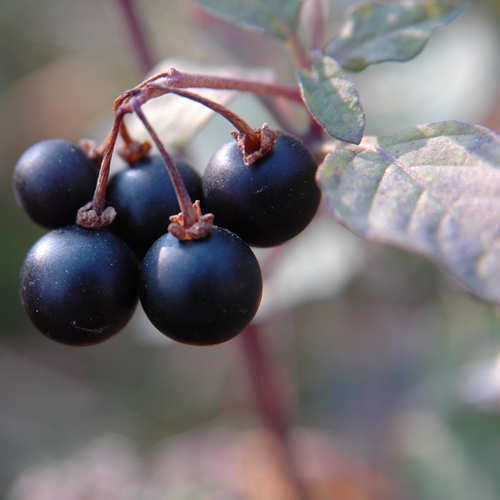
Black nightshade
Scientific names: Solanum nigrum
Family: Solanaceae
Alternate names: Blackberry Nightshade, Crève-Chien, Garden Nightshade, Herbe à Gale, Herbe aux Magiciens, Herbe Maure, Houndsberry, Kakamachi, Kakmachi, Long Kui, Makoi, Morelle Noire, Myrtille de Jardin, Petty Morel, Poisonberry, Raisin de Loup, Tomate du Diable, Tue-Chien, Yerba Mora
Background
Black nightshade (Solanum nigrum) is a plant with a musk-like smell when wilting. It contains a chemical that can be toxic when consumed.
Black nightshade contains a chemical called solanine which is poisonous to humans. The green fruits contain the highest amounts of solanine and therefore are the most toxic parts of the plant.
People use black nightshade for stomach irritation, cramps, spasms, pain, nervousness, and many other conditions, but there is no good scientific evidence to support these uses.
Black nightshade contains a chemical called solanine which is poisonous to humans. The green fruits contain the highest amounts of solanine and therefore are the most toxic parts of the plant.
People use black nightshade for stomach irritation, cramps, spasms, pain, nervousness, and many other conditions, but there is no good scientific evidence to support these uses.
Safety Safety definitions
When taken by mouth: Black nightshade unripe berries and leaves are likely unsafe. These contain a toxic chemical called solanine. At lower doses, they can cause nausea, vomiting, and other side effects. At higher doses, they can cause severe poisoning, which can lead to death.
There isn't enough reliable information to know if the ripe berries of black nightshade are safe or what the side effects might be.
When applied to the skin: There isn't enough reliable information to know if black nightshade is safe or what the side effects might be.
There isn't enough reliable information to know if the ripe berries of black nightshade are safe or what the side effects might be.
When applied to the skin: There isn't enough reliable information to know if black nightshade is safe or what the side effects might be.
Special Precautions & Warnings:
Pregnancy and breast-feeding: It's likely unsafe to use black nightshade while pregnant. It might cause birth defects.Effectiveness
Effective Effectiveness definitions
There is interest in using black nightshade for a number of purposes, but there isn't enough reliable information to say whether it might be helpful.
Dosing & administration
Black nightshade can be poisonous. There isn't enough reliable information to know what an appropriate dose of black nightshade might be. Consult a healthcare professional before using.
Interactions with pharmaceuticals
It is not known if Black Nightshade interacts with any medicines. Before taking Black Nightshade, talk with your healthcare professional if you take any medications.
Interactions with herbs & supplements
There are no known interactions with herbs and supplements.
Interactions with foods
There are no known interactions with foods.
vital.ly has licensed monographs from TRC Healthcare.
This monograph was last reviewed on 13/06/2025 10:00:00. Monographs are reviewed and/or updated multiple times per month and at least once per year.
Natural Medicines disclaims any responsibility related to medical consequences of using any medical product. Effort is made to ensure that the information contained in this monograph is accurate at the time it was published. Consumers and medical professionals who consult this monograph are cautioned that any medical or product related decision is the sole responsibility of the consumer and/or the health care professional. A legal License Agreement sets limitations on downloading, storing, or printing content from this Database. No reproduction of this monograph or any content from this Database is permitted without written permission from the publisher. It is unlawful to download, store, or distribute content from this site.




